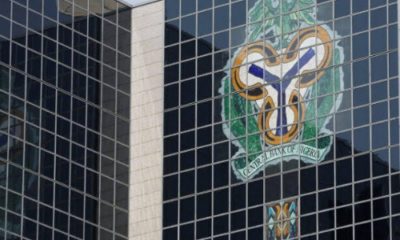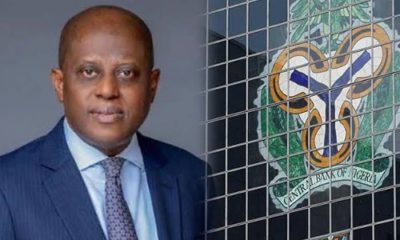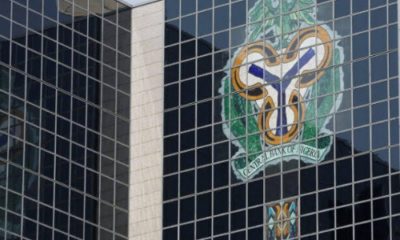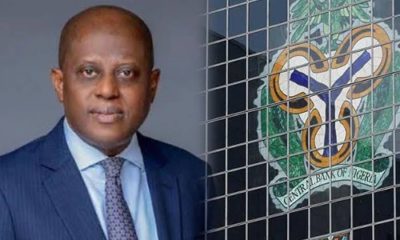Finance
NDIC can’t supervise banks, CBN tells Senate

ABUJA-The Central Bank of Nigeria on Monday rejected some of the proposed amendments to the Nigeria Deposit Insurance Corporation Act.
The central bank insisted that some provisions in the document were targeted at usurping some of its core mandates, especially the supervision of the banks.
The CBN Governor, Mr. Godwin Emefiele, stated this at a one-day public hearing on the ‘NDIC Act 2006, Cap N102 LFN 2012 (repeal and re-enactment) Bill 2015’ organised by the Senate Committee on Banking, Insurance and other Financial Institutions in Abuja.
Represented by one of his deputies, Mr. Sulieman Barau, the CBN boss said the amendments being sought to the NDIC Act should be rejected because they were capable of causing chaos and anarchy in the financial sector.
He explained that some of the proposed amendments sought to confer coordinate functions and powers on the NDIC.
The governor argued that the NDIC, being the undertaker, could not be a judge and a prosecutor in its own case.
“The implications of the proposed amendment to the NDIC Act enactment will make the NDIC a parallel or a coordinate regulator for banks as the CBN,” Emefiele said.
He added that the controversial bill was also seeking to confer conflicting supervisory functions and powers on the NDIC over banks and create overlapping regulatory responsibilities for the two agencies.
Emefiele also stated that the powers that the NDIC was seeking and the consequences were analysed to include among others, power to license and supervise banks without reference to the CBN.
He also noted that the power to determine the licences of banks and to appoint itself as a liquidator were contained in the proposed NDIC Act.
Emefiele said, “It is pertinent to mention that all the above powers, which the NDIC seeks to assume and exercise, are ostensibly to ensure that it carries out its function as a risk minimiser and that depositors of distressed banks and other deposit-taking financial institutions are paid in good time to avoid delays.
“While the CBN supports the desire to pay depositors of distressed institutions in good time, the proposal to make the NDIC the judge and juror in cases involving banks is fraught with dangers and is a recipe for financial instability. It is indeed the ingredient for chaos and anarchy, and is not practised in any financial system in the world.
“There is also the moral hazard of the NDIC as a deposit insurer that charges premium on the basis of the riskiness of an institution, which it supervises without recourse to the CBN to rate such institutions as riskier than they actually are in order to enhance the premium charged to bolster the deposit insurance fund.
“Consequently, it is essential that the NDIC must flow from its primary function, which is the basis for its establishment; that is, deposit insurance.
“Then, and only then, will its role in the financial system as it relates to banks and other deposit-taking financial institutions be properly defined.”
However, the Managing Director, NDIC, Alhaji Umaru Ibrahim, in his presentation, said even though disagreements existed between the corporation and the central bank, the NDIC was not seeking any role outside its lawful mandate.
Ibrahim said the NDIC was seeking the amendments to its Act in order to ensure safety and soundness in the banking system.
He added that the corporation was not in competition with the CBN but cherished its operational independence and mandate as provided by its Act.
The NDIC boss said, “We may have disagreements here and there, we are not reinventing the wheel. I noticed from the presentation of the CBN governor that apparently he may not be aware of the fact that a lot of these have been resolved and will be resolved.
“We are for collaboration, we are for the safety and soundness of the system. We are not in competition with the CBN. At the same time, we cherish our own operational independence and we cherish our mandate as provided by our Act.”
Senate President, David Mark, while declaring the public hearing open, said the exercise was aimed at obtaining authentic information from various interest groups to guide the Senate in its legislative action.
Mark, represented by the Senate Leader, Victor Ndoma-Egba, said, “It is hoped that this exercise, if successfully completed, will produce results that are acceptable to the generality of our citizenry.”
Banking
CBN Denies Currency Devaluation

The Central Bank of Nigeria (CBN) has refuted claims of devaluing the.
Earlier reports suggested that the CBN had devalued the Naira, lowering its exchange rate from N631 to the dollar, compared to the previous day’s rate of N461.60 at the Importers and Exporters (I&E) window.
However, the Central Bank of Nigeria (CBN) released a statement on Thursday through its Acting Head of Corporate Communications, Dr. Isa Abdulmumin, categorizing the report as false information.
In the statement titled ‘CBN Has Not Devalued The Naira’, he said the attention of the apex bank was drawn to the news report by an Abuja based newspaper edition of June 1, 2023, titled “CB Devalues Naira To 630/51”.
However, the CBN stated categorically that the news report was replete with outright FALSEHOODS and destabilizing innuendos, ‘reflecting potentially willful ignorance of the said medium as to the workings of the Nigerian Foreign Exchange Market.’
“For the avoidance of doubt, the exchange rate at the Investors’ & Exporters (I&E) window traded this morning (June 1, 2023) at N465/USS1 and has been stable around this rate for a while.
“The public is hereby advised to ignore the news report by Daily Trust in its entirety, as it is speculative and calculated at causing panic in the market,” the CBN spokesman added.
He, therefore, advised media practitioners to verify their facts from the Central Bank of Nigeria before publishing in order not to misinform the public.
Banking
BREAKING: CBN Increases Interest Rate By 0.5%

The interest rate in Nigeria has been raised to 18.5 percent, up by 0.5 percent, from 18 percent where it was pegged in March 2023.
The Central Banks of Nigeria’s (CBN) Monetary Policy Committee (MPC) resolved to this effect at its third meeting of 2023 in Abuja, on Wednesday.
Governor, CBN, Godwin Emefiele, made the disclosure in the communiqué of the MPC’s meeting, thereafter.
While engaging the media at the end of the two-day meeting, Emefiele, said the committee voted to keep the asymmetric corridor at +100 and -700 basis points around the MPR.
In the view of the MPC, rising inflation rate is traceable to the high energy cost and challenges around the supply chain, among others, which lie outside the corridors of the CBN.
Emefiele said, “The current trend in price development would continue to be monitored by the bank with greater collaboration with fiscal authority to address the drivers of inflation.”
Biztellers reports that the CBN had effected six consecutive interest rate increases, which has seen the rate move from 11.5 percent in March 2022 to 18.5 percent in May 2023.
Finance
Dangers Lurk As Nigerians Resort To Refurbished Gas Cylinders

In Nigeria, people have been forced to come up with creative solutions to cope with the effects of inflation and the economic crisis.
These improvised strategies have not only helped individuals save money, but also enabled them to stay afloat during difficult times.
In a concerning development, the recent trend of boycotting the high cost of cooking gas cylinders in Nigeria may pose a greater risk to lives than it does in terms of saving money.
Economy&Lifestyle investigations have revealed that the soaring prices of gas cylinders have reached a point where it has become increasingly challenging for average households to afford them, let alone refill them with gas.
The situation is further exacerbated by the fact that the pump price of kerosene, which would typically serve as an alternative, has become prohibitively expensive.
Upon investigation, it was found that the prices of gas cylinders vary depending on their sizes. A 3kg gas cylinder is priced at N14,000, while a 5kg cylinder costs N16,000. The larger cylinders are even more costly, with a 6kg cylinder priced at N17,000 and a 12.5kg cylinder costing N19,000.
Additionally, the expense continues when it comes to filling these cylinders with cooking gas, as it costs N2,600 for a 3kg cylinder, N5,200 for a 6kg cylinder, N8,950 for a 10.5kg cylinder, and N10,650 for a 12.5kg cylinder.
Consequently, an average household that needs to replace a worn-out 5kg cylinder would have to come up with N20,250 to purchase a new cylinder and fill it with gas, which can be a difficult feat to achieve.
As a result, many people have resorted to refurbishing their old cylinders and trying to use them as best as they can. However, this approach poses a significant danger.
Mrs. Rukayat Adesoji, a trader, shared her experience regarding her gas cylinder, which had become rusted and could no longer stand upright since last month. Due to the exorbitant prices of purchasing new cylinders, she resorted to seeking the assistance of a welder.
The welder patched the legs of the cylinder, repainted it, and ever since then, she has been using the refurbished cylinder for her cooking needs.
She said ““My gas cylinder which was 6kg got rusted and no longer stands erect since last month. When I asked for the price, I was told it was N17, 500. I was discussing it with a friend who advised me to take it to a welder to paint it and construct a new stand. I heeded to her advice and at the end spent just N3, 000 to turn my cooking gas to a brand new.”
Apart from refurbishing cylinders, some people don’t even know when their cylinders will expire. Mrs. Mercy Opara, a hair stylist, falls in that category as she explained: “I am taking my gas cylinder to the welder to spray it for me. It just cost N1, 500.
“The cost of buying a new cylinder is high. I have been using my cylinder for over 7 years and I don’t even know the expiry date. I just pray God blesses me so that I can buy a new one. But this one I am managing will look neat after spraying it for another two years.”
Mr. Adekanbi Joseph, a wielder, said he paints cylinder and “To paint and rebuild a cylinder stand, I charge N4, 500. Many people come here to paint as a new cylinder is now very expensive to get.”
Highlighting the potential dangers of using refurbished cylinders, Mr. Benjamin Hope, the Chief Executive Officer of FKT Cooking gas and general goods, emphasized the risks involved.
He stated that even a brand new cylinder can pose a risk of explosion if the locks are not properly secured after use or if the cylinder filled with gas is moved from one location to another.
He said “A brand new cylinder can explode if the locks are not well keyed after using and if the cylinder filled with gas was moved from one place.
“There are many reasons for the high cost of gas cylinders in Nigeria. One is the cost of importation due to the exchange rate. Another is the increased migration from the use of kerosene to cooking gas which has necessitated increased demand for gas cylinders. You know that in such a case there will be increased importation of cylinders.”he added



















